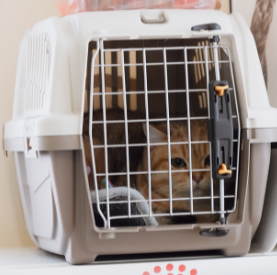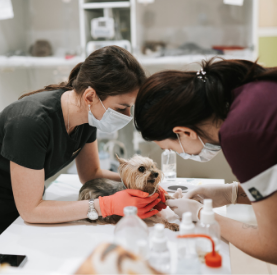Why does my cat mark
Опубліковано
23.01.2024
Why does my cat mark
Why does my cat mark if he is neutered: cystitis or behavioral disorders? Who should I contact - a felinologist or an animal psychologist?
Cats have always been mysterious and curious animals, and their behavior can sometimes be a major mystery to their owners. One of the most common problems that owners of neutered cats may face is territory marking, which is the process of depositing urine in specific places. This behavior can occur for a variety of reasons, including cystitis and behavioral disorders. In this article, we will look at these aspects and determine who to contact to solve this problem - a felinologist or an animal psychologist.
Why neutered cats can mark territory
1. Cystitis or inflammation of the genitourinary system.
Cystitis is an inflammation of the bladder that can occur in cats regardless of gender or neutering status. However, neutered cats can also develop this problem. Symptoms of cystitis can include pain when urinating, frequent trips to the toilet, sometimes cats meow when going to the toilet, and blood may be present in the urine. The cat may mark the territory in an attempt to express its discomfort or pain. It may change the place of going to the toilet (it may go next to the litter box or on the owners' bed)
2. Behavioral disorders
Neutered cats can also mark territory due to behavioral disorders. The reasons for this can be various, including stress, changes in the environment, conflicts with other animals, or even insufficient attention from the owners.
Who to contact for help?
1. Felinologist
A feline behaviorist is a specialist in cat behavior. If your neutered cat is marking territory, and you are sure that it is related to behavioral problems, a felinologist can be an important consultant. A felinologist can conduct a detailed analysis of your cat's health and determine whether the cause is due to inflammatory processes in the cat's bladder, and develop a treatment plan. If inflammatory processes have been ruled out, it is worth getting additional advice from a zoopsychologist.
2. Zoo psychologist
An animal psychologist can also be helpful, especially if the territory marking problem is stress-related or psychological. Zoopsychologists specialize in the study of animal psychology and can help you understand what factors affect your cat and how to work with them. Sometimes such problems can be solved quite quickly, while some have to be worked on for months.
Conclusion.
Territory marking in neutered cats can be a task that requires attention and understanding on the part of the owners. First, it is important to rule out possible medical causes, such as cystitis and inflammation of the genitourinary system. Then, if the problem is related to behavioral disorders, contact an animal psychologist for professional help and to develop a plan to influence your cat's behavior. Remember that with understanding and patience, most behavioral problems can be solved.
Схожі статті

Effect of castration on the animal
Among the positive changes that occur after castration are that the animals become less aggressive, more friendly with each other, and there is no need to divide the territory.

Preparation for ultrasound examination (ultrasound)
It is important to remember that proper preparation of the animal can significantly facilitate the abdominal ultrasound process. By performing this procedure, the doctor can detect possible problems in time and provide proper treatment. High-tech ultrasound is one of the ways to quickly and informatively diagnose and ensure a long and healthy life for our pets.

WHY ARE DOCTORS NOT ALL-POWERFUL?
A good doctor is worth its weight in gold. Everyone understands this and can spend years looking for the best one, and when they find one, they will expect miracles.

SYNDROME OF TIRED TANKLES IN CATS
Tired antennae of a cat or What do you know about fatigue?

Side effects of antiparasitic drugs
The need for tick and flea treatments for pets is a well-known fact.

How you can help calm cats and reduce stress today
the head of the felinology department, tells us.

Rules for traveling with pets.
What can we do and what is needed?

8 простых правил для защиты питомцев в холодный период
Последние недели температура на улице начала стремительно снижаться ниже нуля. А это означает, что наши питомцы находятся в особой зоне риска.

Preparation for anesthesia
What you should know about preparing your pet for surgery

